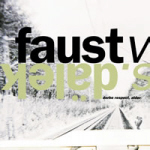|
|
 |
Dusted Reviews
Artist: Faust vs. Dälek Album: Derbe Respect, Alder Label: Staubgold Review date: Aug. 10, 2004 |

|
|
|
 |
Hip-hop? Krautrock? Punk? Outsider craziness? The title of Faust's collaboration with dälek suggests a kind of animosity, both through the use of "vs." and "derbe respect, alder," a hodgepodge of Hamburg hip-hop slang and English that means something like "fucking respect, geezer" (it’s generally positive, but who’s to say). The music is destructive, based around eerie hums, random bursts of swirling sound, and the bombast of dälek’s beats. And the lyrics, too, are obsessed with war, violence, destruction, death, ambivalence and so forth, illustrated in MC dälek’s vast vocabulary and elocution. But is "Derbe Respect, Alder" really trying to rip itself apart at the seams? Are these two distinct groups with distinct sounds really trying their hardest to put the other out of its misery?
In a way, yes. Much of Faust’s and dälek’s music uses ambience, collage, groove, emptiness, and claustrophobia as tools of decomposition and destruction. Faust was always the most enigmatic of the krautrock groups, and dälek has always been one of the more out there hip-hop acts out there, looking more to recreate the sound of the concussion bombs from Star Wars than a hit single. The two artists clearly share a natural affinity, however; a quick listen to dälek's Negro Necro Nekros reveals it be the grandchild of Faust I. It comes as no surprise that when brought together, these two would find a common language that is both creepy and moving.
As with any good collaboration, the best moments here are those when its impossible to tell who is doing what. In too many artistic meetings, it is too easy to tell which individual is dominating the proceedings at any given point. Take, for instance, the Matthew Shipp/Anti-pop Consortium collaboration from last year. Each side held back in deference to the other too much, eliminating any cohesion the record might have had, and leading to a mediocre result. With a few exceptions, Faust and dälek go at each other full bore, melding into a single being, not unlike that one scene from Sesame Street where two aliens crash into one another at full speed to create a new alien entirely. Even the group's most recognizable element, MC dälek's voice, is processed and modified into just another piece of the collage. This isn’t to discount his lyrics, just to point out that the pitch, rhythm, and timbre of his voice serve a greater role in the final mix than their ideological content.
So once again, what is this? It is, in a way, a metaphor for the job of the DJ. He must constantly find ways of combining predetermined, precreated elements (in the case of the DJ, the slabs of vinyl; here, the bands’ individual personalities) into something unique. When the bass line comes in midway through "Collecive Twilight," you can almost feel hands on a DJ mixer playing with and modifying the personalities on his two turntables.
By Dan Ruccia
|







